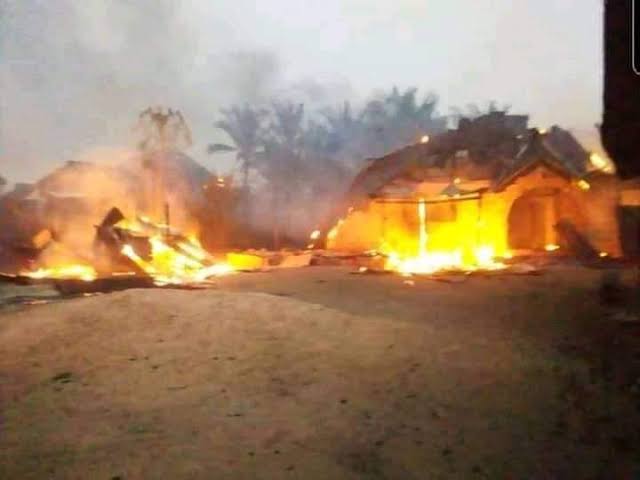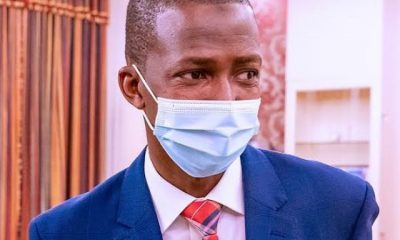Opinion
The Agbor Gas Plant Explosion

By Jerome-Mario Utomi
It is now obvious that while the world has changed around us, our nation has stood still. This affirmation is predicated on the information that as the dust raised by human carnage of October 8, 2020, in Baruwa, Iyana Ipaja area of Lagos State, gas explosion that claimed no fewer than five lives, razed 25 buildings, 16 shops, and a private school building, is beginning to settle, and the pains caused the families are beginning to wane, another wound that will require a long time to heal was on Saturday inflicted on the minds of Nigerians. As a gas station in Agbor, Delta state, on Friday 22nd January 2020, exploded leaving about a dozen dead and many others hospitalised.
Expectedly, the state Governor, Senator (Dr.) during a visit to the spot, described the fire disaster as an unfortunate incident and announced that the State Government would pick the bill for medical treatment of the surviving victim that were referred to a specialised centre for the treatment of burns at the University of Benin Teaching Hospital (UBTH).
To the uncritical minds, these remarks/intervention by Mr. Governor, in some ways could be judged a perfect response expected of a proactive leader.But at about the same the time the governor was making those promises, what came flooding in mind was the memory of a related ugly occurance of March 2020, in Abule Ado area of lagos state where massive gas explosion in similar style rocked and killed over 23 persons of which the dust raised by its occurrence is yet to settle.
More than anything else, this latest occurrence has painted a cursory picture of a nation that is not ready to learn from its past mistakes, apply its lessons or develop visions and reforms based on what works. In the objective estimation of every right thinking Nigerian, gas plant explosions in recent times is no longer unique to Lagos or Delta state. It is neither Okowa nor Sanwoolu specific but a challenge that has morphed to assume a national menace needing urgent holistic attention.
Against this backdrop, the questions that bother this writer are; Why are the incidence of gas explosions in the country now on the increase? Has state Governors forgotten that provision of security and pursuit of economic welfare of citizens is the only two constitutional responsibilities of the state which all leaders must achieve? Who approves the setting up of gas plants in densely populated residential locations such as Agbor, Abule Ador and Baruwa? What are the regulatory agencies in charge of approval and monitoring of gas stations doing about it and what is the ministry responsible for the environment and infrastructure doing to change the narrative? And above, how have the masses and the media promoted this threat?
Beginning with the last,, it will be naïve on the part of this piece to attempt providing answers to how the media contributes to this challenge, without first acknowledging what has been on everyone’s mind in this period of mourning.
From it’s traditional but universal responsibility which the instrumentality of participatory democracy and election of leaders confer on it; the media is to watch the society.‘They are to watch over crimes, injustices, malpractices, and every other act that is deemed unfair and unlawful. Professionally, they are competent to carry out their duties as the fourth estate of the real.. The fact that they are watchdogs means they know what to do, where they are going, and how to discharge their duties as when due’.
But presently, such vision/responsibility has waned.
Media professionals have overtly become more cautious than courageous. They have watched the making of political cum economic decisions that breeds poverty, perpetrates powerlessness and endangers people’s lives, yet took the easy way out without addressing the underlying factors. Curiously, media practice in Nigeria has seen power lately gone the wrong way but assumed it’s the right thing. Watched the nation’s political gladiators redefine democracy in the image of their actions but viewed it normal. And very oddly, the practitioners no longer see themselves as problem solvers or watchdogs of the society but now occupy a high ground they do not understand while leaving the masses that initially depended on them confused.
Take as illustration, in October, 2020, the Social and Economic Justice Advocacy (SEJA), in the course of its monitoring activities around Alapere, Ketu, a densely populated residential part of Lagos state, discovered a newly built gas station.
Apart from the densely populated nature of the area, the gas station was sited at the bus stop and shares a common boundary with a telecommunication firm and a welding and fabrication company. Making the situation more tragic is the fact that in less than about a 150meters from the gas station is a church, St. Michael Catholic church, the biggest church in Ketu that houses over 6000 worshippers every Sunday. These worshipers and others gather at the bus stop, the location of the gas station complained of to board vehicles to their different destinations every Sunday and on other days whenever church activities are scheduled.
Looking at the scary scenario, the Group sent a statement to the media alerting relevant agencies of the urgent need to avert the impending danger, But, to the Group’s consternation, it was only a very few media organizations that considered the statement newsworthy..
From this spiraling decision, media professional appears unaware that to misstate or suppress the news is a breach of trust.
While this piece has already laid down some of the areas the government and the media have failed the people, it will remain a one sided narrative if it fails to talk a little about how the masses also fail their environment. It is true that if the uncaring attitude of the government and media professionals poses a challenge, that of the masses is a crisis.
This argument is predicated on the fact that no gas station is built in one day. The people see such construction spring up in residential areas but for yet to be identified reasons, fail in their patriotic duty to report such development and provide needed care to their environment. It was actions such as this that accounts for the present happenings and as a nation; we cannot get out of this circle of chaos without providing care at the most fundamental levels. We can no longer keep things the way they are hoping that luck will correct our part and put things in the right perspective.
To achieve this objective, the Government (Federal, state and local) has to be nimble in adopting and adapting solutions that renders picking of victim’s bills unnecessary. The masses/media on their part should unlearn apathy and develop zeal to showing commitment to what happens in their environment.
Utomi is the Programme Cordinator (Media and Public Policy), Social and Economic Justice Advocacy (SEJA), Lagos.







